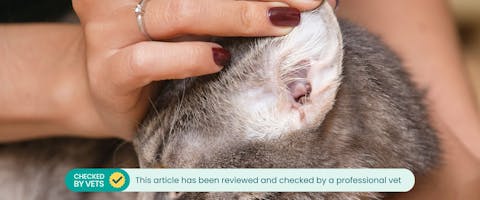Updated 21/11/2023
Ever heard of cat ear mites? Although ear infections are less common in cats than dogs, ear mites - also known as Otodectes cynotis mites - are the second most common external parasite on cats after fleas. They’re no bigger than the head of a pin, however, they can cause major health issues if left untreated.
Fret not feline fanatics and protective pet parents, we have you covered. Below, we’ve summarized what ear mites in cats are, the symptoms of ear mites, as well as how to treat cat ear mites. If you’re all ears, let’s begin…
Trending posts
Purr-use some of the top blogs our members have been loving this month- Top male dog names for your new furry friendGot a new furry family member in your pack? Check…

- Top female dog names for your new fluffy palWelcoming a new pooch into your family? Explore…

- 250+ gray cat names your silver feline will loveRecently welcomed a fluffy gray bundle of joy into…

- What are normal pet sitting rates?Discover the average pet sitting rates for animals…

- Unique dog names to stand out from the packDare to be different with our list of the best…

What are cat ear mites?
Ear mites, Otodectes cynotis mites, pains-in-the-furry-behind, or whatever you want to call them, are highly contagious parasites. These tricky little bugs take up residency in your cat’s ear canal and can cause several problems in our feline friends.
These little pests don’t jump like fleas but can crawl like crazy, so it’s very easy for outdoor kitties to accidentally pick them up.
What causes cat ear mites?
Like fleas, cat ear mites are picked up by other infected animals. This is a problem primarily found in outdoor cats, or with kitties who also live alongside canines. Whether it’s from head bumping a fellow purring pal or scraping with another for territory, ear mite infections can occur from the briefest of cat contact.
Symptoms of ear mites in cats
According to Small Door Veterinary, the symptoms to look for are:
- Head-shaking
- Excessive scratching at ears
- Drooping ear flap
- Dark brown material in the ear
- Inflammation
- Pus
- Red or inflamed ears
- Warm ears
Although these external symptoms are alarming, these symptoms can also be a sign of secondary infection or other issues like cat acne. If your cat or kitten is showing any signs of discomfort or unusual behavior, contact your vet immediately.
How to check for ear mites in cats
It’s best to check your kitty’s ears frequently for cat ear mites, especially if you have an outdoor cat. But, if you’ve noticed your cat excessively scratching its ears or head shaking, make an appointment with your vet and gently check the tops of your feline’s ears. Infected furballs will have a build-up of black ear wax which looks not unlike coffee grounds. Be warned, this discharge smells nothing like a freshly brewed espresso!
Ear mites are no bigger than the size of a pinhead, but adult mites can be seen with the naked eye. As tempting as it may be to clean your cat’s ear yourself, always consult a vet before attempting any home remedies.
The best way to treat cats with ear mites
If your kitty is showing any symptoms of cat ear mites or discomfort, you should take them to your vet. There are a variety of medicines your vet will recommend applying to treat ear mites, which you’ll need to continue doing at home. According to Dr. Miller from Cornell Feline Health Center, “There are many topical, oral, and systemic agents…are highly effective. A few drops put into an affected ear several times a day for a month or so will usually smother the mites.”
Your veterinarian may also clean your cat’s ears to remove any infected ear wax and visible ear mites. Ear cleaning with vet-prescribed cleaner may also be something your veterinarian asks you to continue at home.
Cat ear mite treatment can take up to three weeks to take effect - this is the general lifespan of cat ear mites from hatching to adulthood. Be consistent with the medicine provided by your vet and be sure to take your purr-baby to a follow-up appointment a month later. Don’t worry, it’s unlikely your vet will ask you to try and feed any pills to your feline friend!
As always, there are many home remedies recommended all over the Internet. However, these home remedies should be avoided. Do not put anything in your cat’s ears without first consulting your vet.
Meet our veterinary expert, Emma
This article has been checked by veterinarian Emma Chandley, BVetMed MRCVS PGCertSAS. Emma graduated from the Royal Vet College in London in 2011. She has a keen interest in surgery and went on to do a postgraduate certificate in small animal surgery and was then awarded advanced practitioner status in the same discipline.
If you’re a TrustedHousesitters member and you’re ever worried about your favorite feline or cat-sitting companion, you can always call our 24/7 Vet Advice line for free. Always alert your vet to any changes in behavior or appearance.

